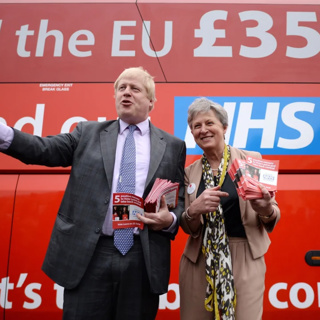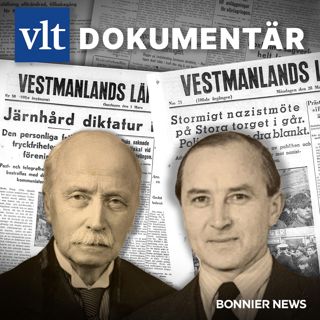
93. A Peace of Kings
The Congress of Vienna set up peace in Europe for decades. Indeed, it prevented any kind of general war across the whole of the Continent for nearly a century, until the First World War broke out in 1914. But it wasn’t quite as straightforward as the outcome might suggest. The power of Russia, with 600,000 troops now occupying many parts of Europe, led to a quick rehabilitation of the former enemy, France. And some very clever diplomatic work, by the remarkable trio of the French Foreign Ministers of France, Talleyrand, Austria, Metternich, and Britain, Castlereagh, proved necessary to put the Russian bear back in his box. The other aspect of the Congress is that what it ushered in was a Peace of Kings. Ideas thrown up by the French Revolution, of the rights of man, of popular sovereignty, of equality between citizens, were decidedly out of fashion. Which was going to prove problematic in a Britain facing harsh conditions and growing discontent. Illustration: The Russian Bear inspired fear in the west: Tsar Alexander I published by Colnaghi & Co on 2 May 1814. National Portrait Gallery D15858 Music: Bach Partita #2c by J Bu licensed under an Attribution-NonCommercial-No Derivatives (aka Music Sharing) 3.0 International License
5 Juni 202214min

92. We meet our Waterloo
Napoleon makes his second bid for power, and comes unstuck, as Wellington and Blücher prove too much for him at Waterloo. It’s a victory the Brits like to celebrate as a great triumph for the country, up on a par with Trafalgar ten years earlier. The truth, though, is that even within Wellington’s army, there were more Germans than Brits. And, when you add in Blücher’s Prussians, Napoleon’s defeat owed far more to German soldiery than to British. Though Wellington’s generalship, alongside Blücher’s, was a crucial factor. The Iron Duke stood firm. Just as the old man Blücher kept his word and came to his aid, personally leading his troops, despite his advanced age and his injuries. Between them, they finished Napoleon's rule. Illustration: A British infantry square withstanding cavalry attack. Elizabeth Thompson, The 28th Regiment at Quatre Bras. This work is in the public domain including in the United States, because it was published (or registered with the U.S. Copyright Office) before January 1, 1927. Music: Bach Partita #2c by J Bu licensed under an Attribution-NonCommercial-No Derivatives (aka Music Sharing) 3.0 International License
29 Maj 202214min

91. Return of the King
It was peace at last. For the first time, apart from one short break, for a generation. Peace, however, requires managing, just like war does. That management took the form of a new approach to the relations between European states, with the old concept of a Balance of Power giving way to the new one of a Concert of Nations. The innovation meant that nations would find a way to settle their differences by diplomatic rather than military means, instead of lining up in two hostile camps, of slightly varying composition down the decades, with only fear of each other to keep the peace. After all, that Balance of Power approach hadn’t worked too well. Remember how many wars we’ve talked about as we worked out way through the eighteenth century? To give the new thinking a secure foundation, the victorious allies set up the Congress of Vienna, where a minister from the United Kingdom would play a key role: the Foreign Secretary, Viscount Castlereagh would draft most of the documents, just as he drafted the terms imposed on defeated France. Which, in passing, meant he had no time for the simultaneous negotiations of a peace treaty with the United States, ending the War of 1812. Perhaps explaining why the British representatives at that second set of discussions were perhaps outmanoeuvred. And then, just to spoil the moment, France, and above all its deposed Emperor, showed the world that they didn’t take their defeat as conclusive. Illustration: Frontispiece of the Final Declaration of the Congress of Vienna (public domain). Music: Bach Partita #2c by J Bu licensed under an Attribution-NonCommercial-No Derivatives (aka Music Sharing) 3.0 International License
22 Maj 202214min

90. A war fought for no good reason
Although Britain was in the closing stages of a long and desperate struggle with France, it somehow managed to get itself sucked into a separate war with the United States. Called the War of 1812, accurately for the start, hopeless for its end – in 1815 – it was unnecessary and avoidable. As a Canadian historian, Pierre Berton, put it when talking about the final accord, the Treaty of Ghent, “It was as if no war had been fought, or to put it more bluntly, as if the war that was fought was fought for no good reason”. For all that, it cost quite a few lives, and a lot of treasure and, as a by. Product, it ended for ever the capacity of Native American to resist further US encroachment on their lands. It also taught a lot of lessons about how not to fight wars at a time when firepower had become far more devastating than in earlier times. Lessons that weren’t, unfortunately, learned. To the cost of a lot of dead or maimed soldiers from future wars. Illustration: Battle of Lake Erie in the war of 1812 in Erie, Pennsylvania. Photo by William Henry Powell, from https://www.goodfreephotos.com Music: Bach Partita #2c by J Bu licensed under an Attribution-NonCommercial-No Derivatives (aka Music Sharing) 3.0 International License
15 Maj 202214min

89. 1812: turning point
1812 was a year of turning points. It was the year that Spencer Perceval was murdered, the only British Prime Minister to have met such a fate, and his successor Lord Liverpool was appointed. Just a tad more significantly, it was also the year when Napoleon, sick of seeing his anti-British blockade, the Continental System, being undermined by nations ostensibly part of it, decided to invade territory belonging to two of them. The first was Sweden. The second, far more dangerously - for him as it turned out - was Russia. He won battles during his march to Moscow, but his retreat from that city has become a byword for military catastrophe. It wiped out the colossal and highly effective army he'd built. Meanwhile, at the other end of Europe, Wellington saw the tide turn in his favour in the Peninsular War against the French in Spain. Not, as we discover, that there was much that was glorious about that war. After the defeat in Russia, France found itself facing another Coalition, the Sixth. It proved too powerful for him. Russians, Austrians and Prussians arrived in France from the East. Wellington with his British, Spanish and Portuguese troops arrived from the Southwest. Napoleon was forced to abdicate and went into exile on the island of Elba, off the coast of Italy. It was peace at last. Though not for Britain. That crucial year of 1812 had seen it embroiled in another war in parallel to the one in Europe. But that's the subject of the next episode. Illustration: Retreat from Moscow by Franciszek Kostrzewski, 1854. Public domain Music: Bach Partita #2c by J Bu licensed under an Attribution-NonCommercial-No Derivatives (aka Music Sharing) 3.0 International License
8 Maj 202214min

88. Murder in the Commons
This is where we start to get to know the future King George IV, in the time when he became Prince Regent. We also meet his friend ‘Beau’ Brummel and talk about the disastrous way that friendship ended. Disastrous, that is, for poor old Beau. This was during the premiership of Spencer Perceval. It was while he was in office that the Peninsular War really started to get some momentum, behind Arthur Wellesley, by now Viscount Wellington (he would become Duke later). Even so, Britain's war effort against France was still mostly economic , through its blockade of French ports. That blockade, however, hurt Britain too, as well as neutral nations whose ships were being intercepted. Among those neutral nations, the United States were particularly resentful of British actions, and relations were swiftly deteriorating to a point where war seemed imminent. Indeed, the blockade became such a double-edged sword that Perceval was on his way to the Commons to debate whether it was time to slacken off a bit, when a waiting assailant turned him into a unique figure among British Prime Ministers: the only one to have been murdered. Which is practically the only thing people remember about him, if they remember anything at all. Illustration: Spencer Perceval, by George Francis Joseph, 1812 National Portrait Gallery 1031 Music: Bach Partita #2c by J Bu licensed under an Attribution-NonCommercial-No Derivatives (aka Music Sharing) 3.0 International License
1 Maj 202214min

87. War, a war crime, and a duel
The Ministry of all the Talents has fallen and the Duke of Portland, after a record-breaking gap of 24 years, has formed a new government. The people making it up are now referred to as Tories and think of themselves that way. As for the Whigs, who had a brief taste of power with the Talents, their first in 23 years since 1783, they’re going to have to wait to return to power until 1827. Meanwhile, the war continues to go badly for the nations fighting France. The Fourth Coalition collapsed like the Third. Now a Fifth, which does produce the first ever defeat of an army personally commanded by Napoleon, ultimately goes the same way as the Austrians are once more massively defeated within a couple of months of that victory. Vienna is occupied again and Napoleon helps himself to an Austria Princess as his second wife, to cement a new alliance. Only in the Iberian Peninsula are things beginning to move a little in the direction of the enemies of France as a General, still for the moment referred to as Arthur Wellesley, wins back Portugal. Illustration: The British fleet bombarding Copenhagen in 1807, by Christian William Eckersberg. Public domain. Music: Bach Partita #2c by J Bu licensed under an Attribution-NonCommercial-No Derivatives (aka Music Sharing) 3.0 International License
24 Apr 202214min

86. Abolition of the Slave Trade. By the Talents. Or Blunderers
Slavery: finally, the time had come for a major step to be taken. Oh, no, not the actual abolition of slavery itself. But at least the abolition of the trade in slaves. Funnily enough, that’s something Pitt might have taken on. But he didn’t. He seems to have been a man who understood that politics was the art of the possible. Though sometimes he saw as impossible what might have been in his grasp. Like the slave trade abolition. In the end, that fine move had to be undertaken by his successors. They were the Ministry of All the Talents. Or, depending on your point of view, the Ministry of all the Blunders. Illustration: ‘Am I not a man and a brother?’ Medallion designed for the British Anti-Slavery Campaign by Josiah Wedgwood and either William Hackwood or Henry Webber, 1787. Public domain. Music: Bach Partita #2c by J Bu licensed under an Attribution-NonCommercial-No Derivatives (aka Music Sharing) 3.0 International License
17 Apr 202214min





















